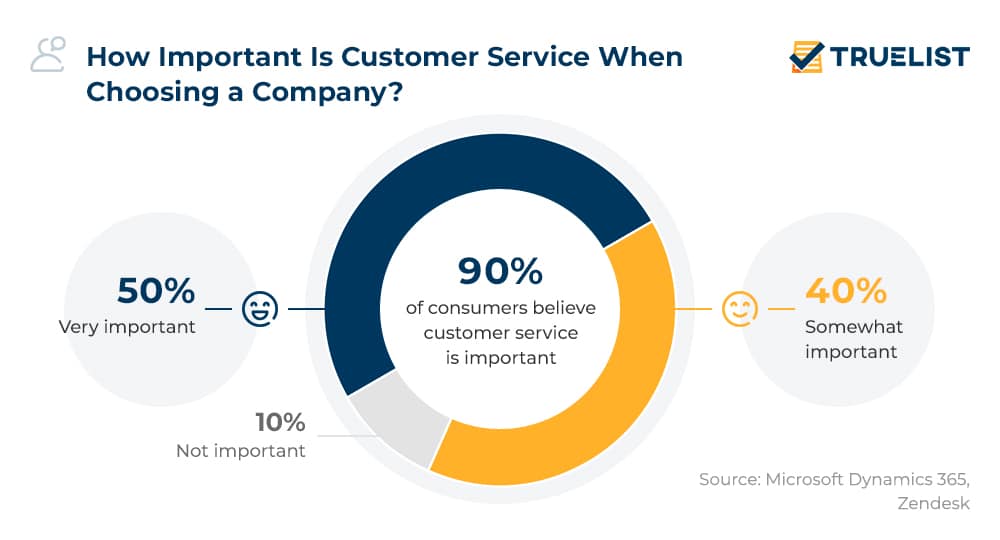Can a Customer Support Center Work for Your Business?
Customer expectations for the B2B brand experience are higher now than ever before—they expect immediate assistance (in just minutes, according to a recent survey), highly personalized interactions, and several channels available for engagement. To meet these elevated demands, companies often turn to customer support centers.
With a comprehensive and dedicated team in place to provide assistance and resolve customer issues, businesses can build strong customer relationships and drive growth over time.
In this guide, we’ll explore customer support centers in greater detail, including their benefits, how to launch and operate one effectively, and factors for deciding whether it’s the right move for your business.
Quick Takeaways:
- Quality customer support boosts retention, which drives increased revenue and growth.
- Benefits of strong customer support include higher customer satisfaction and retention, an enhanced brand reputation, strategic insights, and a competitive advantage.
- Companies can launch in-house customer support centers or outsource to an external provider. Both have advantages, and the right path depends on unique business needs.
What Is a Customer Support Center?
Customer support centers are centralized facilities or departments within a business dedicated to providing assistance and resolving customer inquiries. They serve as centralized, frontline teams for communicating with customers across channels like telephone, email, live chat, social media, and more.
They address customer issues both common and complex—including inquiries, complaints, and technical issues—and work systematically to keep customers happy and build positive customer relationships.
Modern customer support centers also employ advanced technologies to streamline operations and improve customer experiences. These include helpdesk software, live chat platforms, (CRM) tools, and knowledge base platforms.
These tools enable customer support teams to access customer information, track interactions, and provide consistent, accurate, and timely resolutions.
At a high level, your customer support center serves as a critical bridge between your customers and company, ensuring their needs are met so you can deliver maximum value. In a world where 90% of consumers say customer service and support are important when they’re choosing companies to work with, it can also be a competitive differentiator and revenue growth driver for your business.

Benefits of Implementing a Customer Support Center
Improved Customer Satisfaction and Loyalty
By establishing a dedicated support center, businesses can promptly address customer concerns, resolve issues, and provide exceptional service. Satisfied customers are more likely to remain loyal and recommend the business to others.
Customer loyalty has become even more critical as SaaS businesses have gone on the rise along with their subscription business model, which is particularly dependent on high retention driven by a positive customer experience.
Increased Customer Retention and Repeat Business
Speaking of retention—buyers are specifically motivated to stick with companies when they feel that they’re getting the support they need. Quality customer support makes customers feel valued and builds confidence in a company’s ability to solve their problems and help them reach their goals.
At the same time, it drives revenue growth for your business. In fact, repeat business builds on its own momentum. With each new purchase, the likelihood that a customer will buy again increases by about 20%.

Enhanced Brand Reputation
Positive customer experiences result in favorable brand reputation. Happy customers tend to share their positive experiences with others, leading to organic word-of-mouth promotion and potential new customers.
Nearly 90% of B2B buyers specifically seek out word-of-mouth assurance before buying from a company. The happier your customers are, the more likely they are to recommend you to others and help you win new business.
Product Development Insights
Customer support centers act as a valuable feedback channel, providing businesses with insights into product or service issues, common inquiries, and areas for improvement. This feedback helps businesses refine their offerings and stay ahead of competitors.
It also helps you be more responsive to changing customer needs and preferences, reducing the occurrence of dissatisfaction and building trust with your customers over time.
Competitive Advantage
In today’s customer-centric marketplace, having a dedicated customer support center sets businesses apart from competitors who may lack a robust support system. It becomes a unique selling point that can attract and retain customers.
Types of Customer Support Centers
There are two types of customer support centers: in-house and outsourced.
In-house customer support centers are established and operated by the business itself. They provide direct control over the customer support process, allowing for tailored approaches to customer interactions.
However, setting up an in-house center requires substantial investment in infrastructure, technology, and human resources. As such, many businesses choose to outsource their customer support activities to specialized service providers.
Outsourcing offers cost savings, scalability, and expertise, as experienced providers already have the infrastructure and trained staff in place. Choosing an outsourced customer support center requires careful selection of the right partner and effective communication to ensure value and goal alignment.
The right path for your business depends on a number of factors, including your unique goals and the resources you have available to allocate to customer support. Here are some important considerations to help you decide:
- Customer Support Needs and Volume — Assess the volume and complexity of customer inquiries and determine whether a dedicated support center is necessary to handle your workload effectively.
- Budget — Evaluate the costs associated with setting up and operating a support center, including infrastructure, technology, staff salaries, training, and ongoing maintenance.
- Scalability and Growth Potential — Consider your business’s growth projections and whether the support center can scale accordingly to accommodate increased customer demands.
- Staffing and Training Requirements — Determine the number of support representatives you need, their skill sets, and the training required to handle different types of customer inquiries.
- Integration with Existing Systems and Processes — Assess how your customer support center will integrate with existing business systems, such as CRM, order management, and knowledge base platforms for seamless operations.
Implementing a Customer Support Center
Once the decision to establish a customer support center is made, the following steps can guide the implementation process:
- Adopting Infrastructure and Technology — Invest in the required hardware, software, and communication tools to enable smooth customer interactions and efficient support operations.
- Defining Customer Support Processes and Workflows — Establish clear processes and workflows for handling customer inquiries, complaints, and technical issues. Define escalation procedures, response time goals, and protocols for consistent and effective support.
- Hiring and Training Customer Support Representatives — Recruit a support team with strong communication skills, empathy, and problem-solving abilities. Provide comprehensive training on products/services, company policies, and customer service best practices.
- Establishing Metrics and KPIs — Define key performance indicators (KPIs) to measure the success of the customer support center. These may include response time, customer satisfaction ratings, first contact resolution rate, and customer retention rates.
- Continuous Improvement — Regularly review and analyze customer support center performance data to identify areas for improvement. Use customer feedback to refine processes, enhance training programs, and optimize customer experiences.
Keep in mind that when you choose to outsource your customer support center, your provider will handle most of these steps for you and report regularly on progress and performance.
Final Thoughts
Implementing a customer support center can greatly benefit your business by enhancing customer satisfaction, improving brand reputation, and driving customer retention.
Whether you choose an in-house or outsourced approach, a well-designed and properly executed customer support center can provide a competitive advantage and boost your customer retention capabilities.
To implement the right customer support center for your business, carefully evaluate your needs, resources, and scalability before making a decision. By investing in the right infrastructure, technologies, and personnel, you can create a customer support center that fosters strong customer relationships and contributes to long-term success.
Over to You
If you’re looking to outsource your customer support activities, Televerde can help. We provide comprehensive and customizable customer support solutions rooted in industry best practices and designed to align with each customer’s unique needs.
Contact our team to learn more about how we can help enhance your customer support strategy today.


